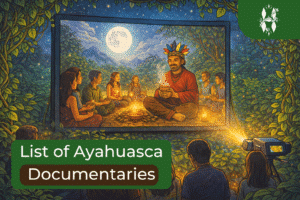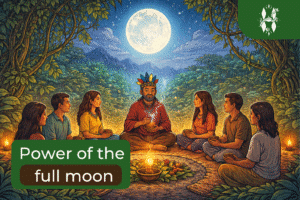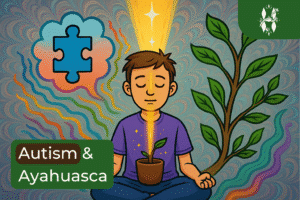Sleepless nights can be more than just an inconvenience; they can be debilitating, impacting your physical health, emotional well-being, and overall quality of life. If you find yourself tossing and turning, staring at the ceiling long into the night, you’re likely desperate for a solution. You may have tried various methods, from counting sheep to prescription medications, all in search of that elusive good night’s rest. Now, you’ve heard about the potential healing properties of Ayahuasca, a traditional plant medicine with roots in Indigenous cultures of the Amazon. This has led you to ponder the question: Could Ayahuasca be the answer to your insomnia woes? In this blog, we will explore this intriguing possibility and delve into the science and anecdotes you should be aware of before considering Ayahuasca as to help relief your insomnia.
Key takeaways:
- Try the traditional tips for a better sleep first.
- Ask yourself the honest and difficult question: What is keeping you up at night? Repressed emotions, unresolved conflicts and unprocessed emotional impact from the past? Or the worries of the future?
- Ayahuasca can help you find solutions for these underlying issues. It is a a process and will help you find resolve.
Table of Contents
Sleep Hygiene – Tried and True Tips
You’re likely no stranger to the laundry list of sleep hygiene tips that doctors, therapists, and well-meaning friends often share. These suggestions range from maintaining a consistent sleep schedule to turning your bedroom into a sleep-friendly environment. You might have already explored:
Consistent Sleep Schedule:
Going to bed and waking up at the same time every day, even on weekends.
Cool Room:
Keeping the temperature around 18 degrees Celsius (65 degrees Fahrenheit) for optimal sleep.
Physical Exercise During the Day:
Engaging in regular exercise can facilitate better sleep, but timing is crucial; avoid rigorous exercise close to bedtime.
End-of-Day Ritual:
Whether it’s reading, meditating, or a warm bath, a pre-sleep ritual can signal your body that it’s time to wind down.
Avoid Eating 3 Hours Before Bed:
This helps to ensure that your digestive system isn’t keeping you awake.
No Screens 90 Minutes Before Bed:
The blue light emitted by phones and computers can interfere with the production of the sleep hormone, melatonin.
Journaling:
Closing the loops in your mind by jotting down your thoughts, or laying out a plan for the next day, can provide a sense of closure and ease you into sleep.
Slowing Down the Breath:
Mindful breathing techniques can calm your mind and prepare your body for sleep.
These tips are effective to a certain extent but may not provide a complete solution, especially if you have a complex or chronic sleep issue. If you’ve been religiously following these guidelines and still find yourself staring at the ceiling at 3 a.m., or if you depend on maintain this routine perfectly for a good night of sleep, it’s understandably frustrating. This leads many to seek alternative solutions, one of which is Ayahuasca.
Why Can’t You Sleep? Identifying the Root Causes
When it comes to insomnia or sleep disturbances, the causes can often be deeply rooted in our emotional and mental states. While external factors such as noise, temperature, and physical discomfort are common culprits, it’s crucial to explore internal struggles that may be compromising your sleep. Here are some common internal factors that could be affecting your sleep quality:
Unresolved Trauma:
For some, the quiet darkness of night can be a breeding ground for traumatic memories or fears that haven’t been fully addressed.
Lack of Closure:
Lingering regrets, unsettled issues, or unresolved conflicts can create an emotional burden that becomes especially heavy at night when you’re alone with your thoughts.
Repressed Emotional Pain:
Emotional pain that hasn’t been processed can manifest as restlessness or sleep disturbances. When there are fewer distractions, these emotions can rise to the surface.
Dissatisfaction with Life:
A sense of unfulfillment or dissatisfaction in life can translate into anxiety or depression, which will keep you up at night.
Self-Imposed Pressure:
Whether it’s work stress, academic expectations, or personal goals, putting too much pressure on yourself can lead to mental exhaustion but paradoxically keep you awake.
Future Worries:
Concerns about upcoming events, career prospects, or personal relationships can keep your mind active, making it difficult to relax and fall asleep.
It’s essential to be honest with yourself about what’s keeping you up at night. Instead of distracting yourself when you find it hard to sleep, try leaning into the discomfort. Sit with your thoughts and feelings to identify the root cause of your restlessness. Sometimes, acknowledging the issue is the first step toward finding a solution.
How Ayahuasca Can Help with Insomnia: Tackling the Root Causes
Ayahuasca isn’t a quick fix or a magic bullet, but it can be a transformative experience that addresses the underlying issues affecting your sleep. Here’s how:
Can Ayahuasca help with insomnia? Processing the Past:
One of the profound effects of Ayahuasca is its ability to bring repressed memories and unresolved issues to the forefront. During an Ayahuasca ceremony, you might revisit past experiences and traumas, allowing you the opportunity to face them, process them, and ideally, find a sense of closure. By helping you to deal with these lingering issues, Ayahuasca can alleviate some of the emotional and psychological burdens that keep you up at night.
Living in the Present:
Ayahuasca can also promote mindfulness, which helps you focus on the here and now instead of getting caught up in past regrets or future worries. Being present is integral to good sleep hygiene; it allows you to wind down properly and prepare your body and mind for rest.
Boosting Self-Confidence and Optimism:
Ayahuasca experiences often bring about a renewed sense of self and a more optimistic outlook on life. This newfound self-assurance can directly combat the anxieties and pressures that contribute to sleep disturbances. Feeling more secure in yourself and your journey can create a mental environment more conducive to sleep.
Must read blog: Ayahuasca healing: healing vs. improvement
If you want to experience Ayahuasca for yourself, we recommend checking out our Ayahuasca Retreat in Colombia.
A Word on Ayahuasca Research and Sleep: Limitations of Existing Studies
In a study with a control group study involving 22 participants sought to examine the impact of Ayahuasca on sleep and according to the study Ayahuasca did not have no significant impact on sleep in the participants. Only a third of the group were administered Ayahuasca, and it was given in a freeze-dried form in the morning. The researchers behind this study were clearly not deeply familiar with the traditional context in which Ayahuasca is used, which might explain the lackluster results.
It’s crucial to understand that Ayahuasca is more than just a biochemical substance; it’s part of a ceremonial ritual. Simply taking Ayahuasca in freeze-dried form without the ceremonial and spiritual context misses out on these essential elements, which could significantly impact the outcomes.
Given this, it’s not surprising that the study didn’t yield significant results. Without the ceremonial aspect, the study doesn’t adequately represent the full experience and healing potential of Ayahuasca.
Conclusion: Can Ayahuasca help with insomnia?
Ultimately, true healing and improved sleep may come from tackling the core issues that keep you awake at night. Ayahuasca has the potential to help you explore and address these underlying problems, facilitating a journey that goes far beyond mere symptom relief. Remember, it’s not a quick fix but a transformative process. By deeply engaging with the factors that impede your sleep, Ayahuasca can help you work towards more restful nights and, consequently, better days ahead. These significant changes will not just impact your sleep patterns, but your overall quality of life.
FAQ:
How does Ayahuasca impact sleep quality?
Ayahuasca does not have a direct impact on your sleep quality. However, Ayahuasca can influence the aspects of your life that impact your sleep quality. So indirectly Ayahuasca can have a positive influence on your sleep.
How much sleep do I need after an Ayahuasca ceremony?
Sleep as much as your body tells you after an Ayahuasca ceremony. It is a physical and emotionally intense time and you should give your body the rest it needs after a ceremony.
Is it ok to sleep in an Ayahuasca ceremony?
It is not recommended to sleep in an Ayahuasca ceremony. That way the Ayahuasca will not be very active in you and you miss a powerful opportunity to connect with yourself. If you feel sleepy in an Ayahuasca ceremony, stand up, walk around a bit to get your blood flowing.





